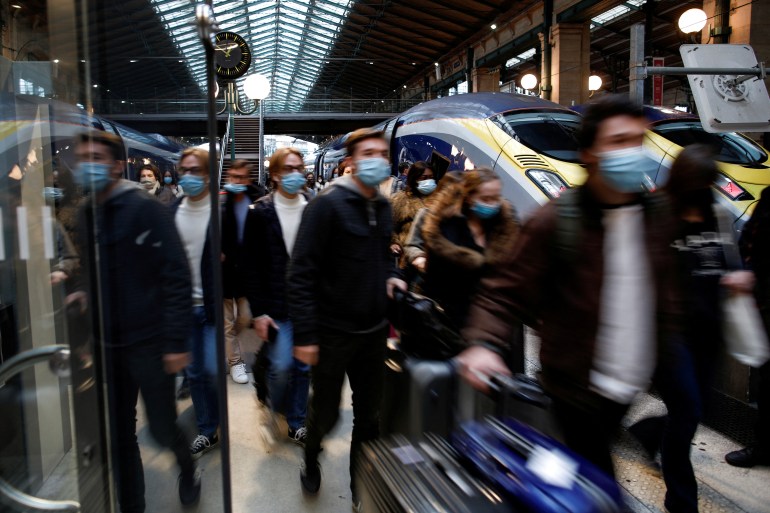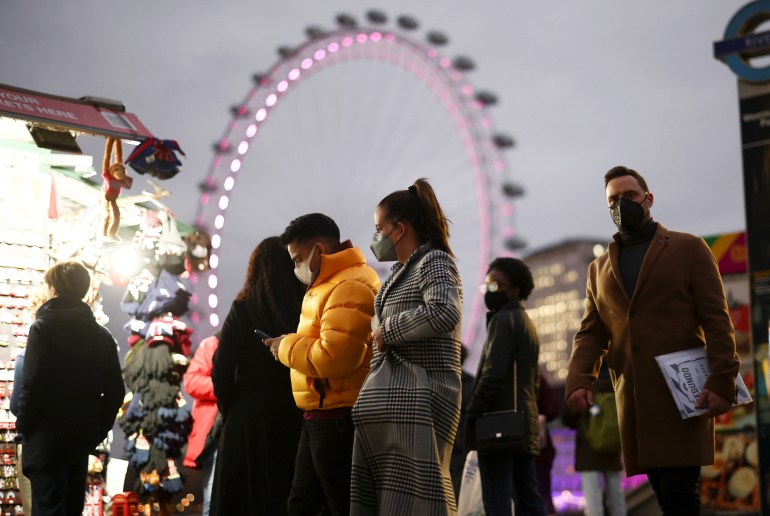France to tighten rules on UK travellers amid Omicron surge: Live | Coronavirus pandemic News
France has said it will tighten restrictions on travellers arriving from the United Kingdom, as infections linked to the Omicron coronavirus variant surge in Britain.
The latest figures showed new COVID-19 infections in the UK reached the highest daily level since the beginning of the pandemic, with more than 78,000 total cases reported on Wednesday.
The move comes after South Korea announced it was will reinstate stricter social distancing rules on January 2, six weeks after easing them, as the number of new infections and serious cases spirals.
Omicron has so far been found in at least 77 countries, according to the World Health Organization (WHO), with many reimposing travel restrictions to stem the spread.
Here are all the latest updates:
British Port of Dover says French curbs will further dampen tourism
Port of Dover said that France’s new travel curbs on passengers from Britain would further dampen already significantly reduced tourist numbers.
“Due to the existing barrier of COVID-19, tourism volumes through this gateway are already significantly reduced and these recent changes are another dampener on the pre-Christmas getaway period,” a spokesperson for Dover said.
“We urge customers to contact their chosen ferry operator for the latest information and to follow GOV.UK travel advice,” the spokesperson said.
“HGV drivers are exempt from these changes and freight continues to move through the port in order to ensure goods reach their destinations, keeping shelves stacked for Christmas.”
EU agency to decide on Novavax jab next week
The EU’s drug regulator said it would decide whether the Novavax coronavirus jab will become the fifth vaccine approved for the bloc at a meeting next Monday.
The US firm’s shot uses a more traditional technology than current vaccines, which experts hope could ease hesitancy and scepticism among the unvaccinated.
“Our human medicines committee will hold an extraordinary meeting on 20 Dec to review the application for the COVID-19 vaccine developed by Novavax,” the European Medicines Agency said on Twitter.
“We will communicate the outcome of this scientific discussion.”
‼️ Our human medicines committee will hold an extraordinary meeting on 20 Dec to review the application for the #COVID19vaccine developed by #Novavax.
We will communicate the outcome of this scientific discussion.— EU Medicines Agency (@EMA_News) December 16, 2021
UK likely to see reliable data on Omicron in January: health official
Britain will most likely only have reliable data on the spread of the Omicron coronavirus variant in early January and possibly in the week between Christmas and New Year, a leading health official said.
Susan Hopkins, the chief medical adviser at the UK Health Security Agency, said so far there were 15 proven cases of Omicron in hospitals, but that the number was likely to be much higher.
“I think the earliest that we will have reliable data is the week between Christmas and New Year and probably early January,” she told a parliamentary committee.
Hopkins said experts would need about 250 individuals in hospital to make a severity assessment compared with the earlier Delta variant.
“We start running that assessment when we start having enough cases who have been admitted hospital to do it and then we run it daily,” she said.
England’s chief medic urges caution as cases surge
England’s chief medical officer Chris Whitty urged people to “prioritise” social and work interactions before and during Christmas.
“People should prioritise what really matters to them and then cut down on the things that don’t,” Whitty told a panel of lawmakers in parliament.
“It may be that what really matters to them is going to the office party. Fine. But I think it really should be for people to make those choices.”
French citizens in Britain can return home but with ‘extra restrictions’
French citizens in the UK will be able to return to France, but there will be “extra restrictions on their movements”, Al Jazeera’s Natacha Butler said from Paris.
“All people will have to have PCR tests before they leave the UK, and then again once they arrive in France – and then they’ll have to quarantine,” Butler said.
“The length of their quarantine will depend on whether or not they are vaccinated,” she added.
The move is going to cause a lot of disruption ahead of the end-of-year holidays, and the French government has advised people to postpone anything that’s not essential until “a lot later”, she said.
 Passengers arrive at the Eurostar terminal at Gare du Nord train station, amidst the coronavirus disease (COVID-19) pandemic, in Paris, France [File: Benoit Tessier/Reuters)]
Passengers arrive at the Eurostar terminal at Gare du Nord train station, amidst the coronavirus disease (COVID-19) pandemic, in Paris, France [File: Benoit Tessier/Reuters)]
Vaccine hesitancy major issue in Africa
The African continent trails as the lowest vaccinated region in the world against COVID-19 and is struggling to get doses through the UN-backed COVAX scheme.
There is also a major issue of vaccine hesitancy in the region, with many opting not to get the shots, making it harder for governments to control the outbreak.
Al Jazeera’s Nicolas Haque, reporting from Dakar in Senegal, said the first case of the Omicron variant has been detected in the country – but this might be the “tip of the iceberg”.
“The fear of the vaccine is spreading faster than this new variant, and this is having disastrous consequences,” Haque said, adding that the biggest challenge governments are facing is administrating those jabs.
Another challenge is getting those vials that have to be kept at sub-zero temperatures to remote areas, where health workers are already dealing with other outbreaks, Haque added.
Poland reports first case of omicron variant
Poland has detected its first case of the Omicron COVID-19 variant, Deputy Health Minister Waldemar Kraska said, state-run news agency PAP reported.
‘War-like situation’ inside Seoul hospitals
Alice Tan, an internist in Seoul, said the situation inside hospitals is like a “mass casualty event” taking place on the daily.
“Some nurses are describing what they’re seeing as almost a war-like situation in terms of the number of admissions that are coming in every day,” Tan told Al Jazeera.
“Critical care directors are now talking with medical ethicists about which patients to let into their ICUs, and which patients they have to allow to basically die because there is just simply not enough room in ICUs to absorb all of the critically ill patients,” she said.
South Korea said it will reinstate stricter social distancing rules as the number of new infections and serious cases surge. The Korea Disease Control and Prevention Agency (KDCA) reported 7,622 cases for Wednesday, a day after posting a new record daily count of 7,850.
France to ban non-essential travel to and from UK
France will ban non-essential travel to and from Britain from the weekend to slow the spread of the Omicron variant, the government said.
From midnight Saturday (23:00 GMT Friday) there will be a “requirement to have an essential reason to travel to, or come from, the UK, both for the unvaccinated and vaccinated… People cannot travel for touristic or professional reasons,” the government said in a statement.
“Faced with the extremely rapid spread of the Omicron variant in the UK, the government has chosen to reinstate the need for an essential reason for travel from and to the UK,” the statement said.It added that French citizens and EU nationals could still return to France from the UK.
 People walk across Westminster Bridge, amid the coronavirus disease (COVID-19) outbreak in London, Britain [Henry Nicholls/Reuters]
People walk across Westminster Bridge, amid the coronavirus disease (COVID-19) outbreak in London, Britain [Henry Nicholls/Reuters]
Denmark approves treatment with Merck’s COVID-19 tablet molnupiravir
Danish health authorities approved treatment with Merck & Co Inc’s molnupiravir tablet for COVID-19 patients at risk of serious illness, including the elderly.
The medication has yet to be approved by the European Medical Agency, which in late November started reviewing US drugmaker Merck’s experimental COVID-19 antiviral pill for adults and said it could issue an opinion within weeks.
South Africa retains ‘Level 1’ curbs in Omicron fight
South Africa’s National Coronavirus Command Council (NCCC) retained its lockdown at “adjusted level one” the lowest of a five-tier system of restrictions, as the country battles the Omicron variant, health authorities said.
“The Council has directed the department to closely monitor the rising COVID-19 infections,” the health department said in a statement, adding that it would track hospital admissions, mortality and recovery rates.
These factors were all largely driven by the Omicron variant, which was contributing to a fourth wave of infections, it added.
Valneva says its booster works as a follow-up to its own COVID-19 shot
French biotech firm Valneva said its COVID-19 vaccine candidate was efficient as a booster for people who had received the same shot as an initial vaccination.
“Initial results confirm that VLA2001 significantly boosted immunity in participants who received VLA2001 as a primary vaccination,” it said in a statement.
The news comes almost two weeks after a British study showed VLA2001 was the only shot out of seven that offered no immunity boost when given to people previously immunised with Pfizer’s COVID-19 vaccine.
Sweden to extend vaccine pass rules to Nordic travellers
Sweden will require visitors from other Nordic nations to have a vaccine pass to cross the border as it gradually tightens restrictions amid rising cases of the Omicron variant, the government said.
“We see an increase in infections in Europe, but also in our neighbours,” news agency TT quoted Prime Minister Magdalena Andersson as saying.
“For visitors from any country except the Nordics, we have a requirement for a COVID pass. Today, the government is going to take the decision that there will be the same requirement also for the Nordic countries.”
The new regulation will come into force on December 21, TT said.
France to restrict travel from UK amid Omicron surge
France is to tighten up restrictions on travel to and from Britain to slow the spread of the Omicron variant which is causing record numbers of cases on the other side of the Channel, the government said.
“We will put in place a system of controls drastically tighter than the one we have already,” government spokesman Gabriel Attal told BFM-TV, saying returning travellers would need a negative test taken less than 24 hours before travel, a quarantine enforced on return to France and limits on trips for tourism.
South Korea to restore tougher curbs as infections spike
South Korea said it will reinstate stricter social distancing rules a month and a half after easing them under a “living with COVID-19” policy, as the number of new infections and serious cases spirals.
Curbs will return from Saturday to January 2, limiting gatherings to no more than four people – as long as they are fully vaccinated – and forcing restaurants, cafes and bars to close by 9pm and cinemas and internet cafes by 10pm, officials said.
Unvaccinated people can only dine out alone, or use takeout or delivery services.

Pingback: 1win